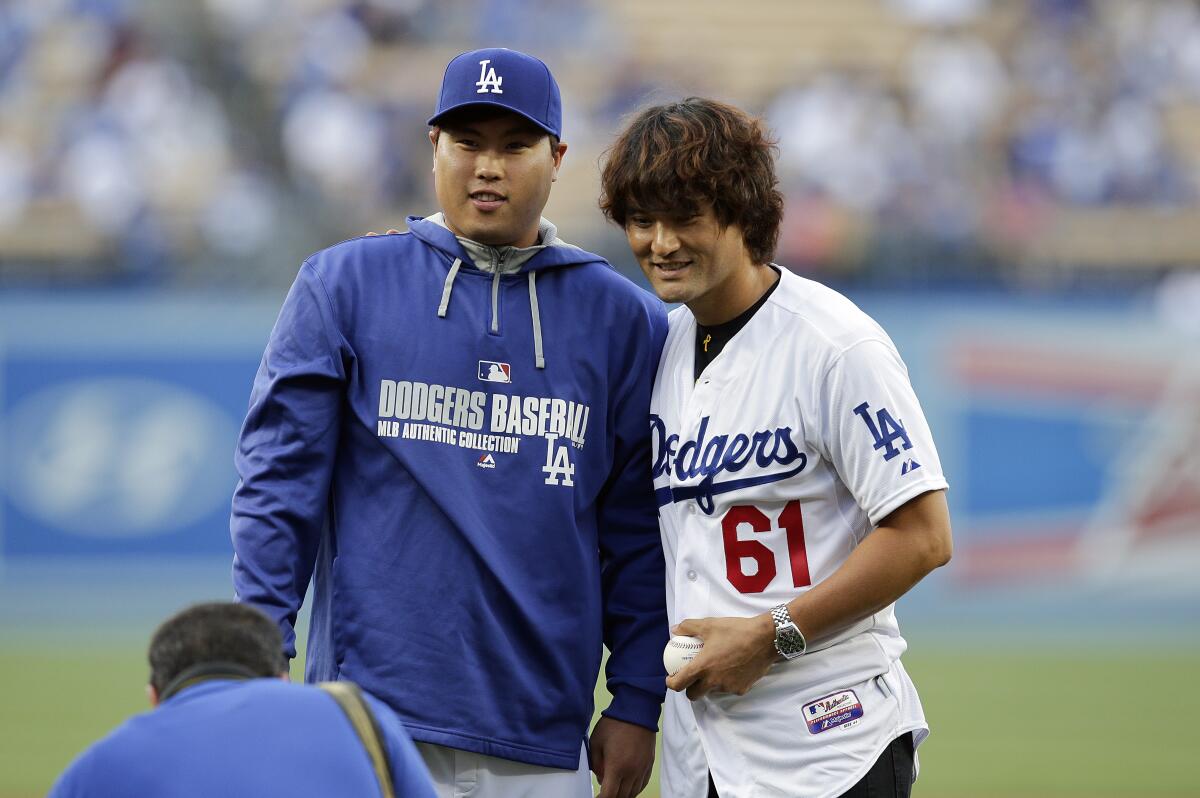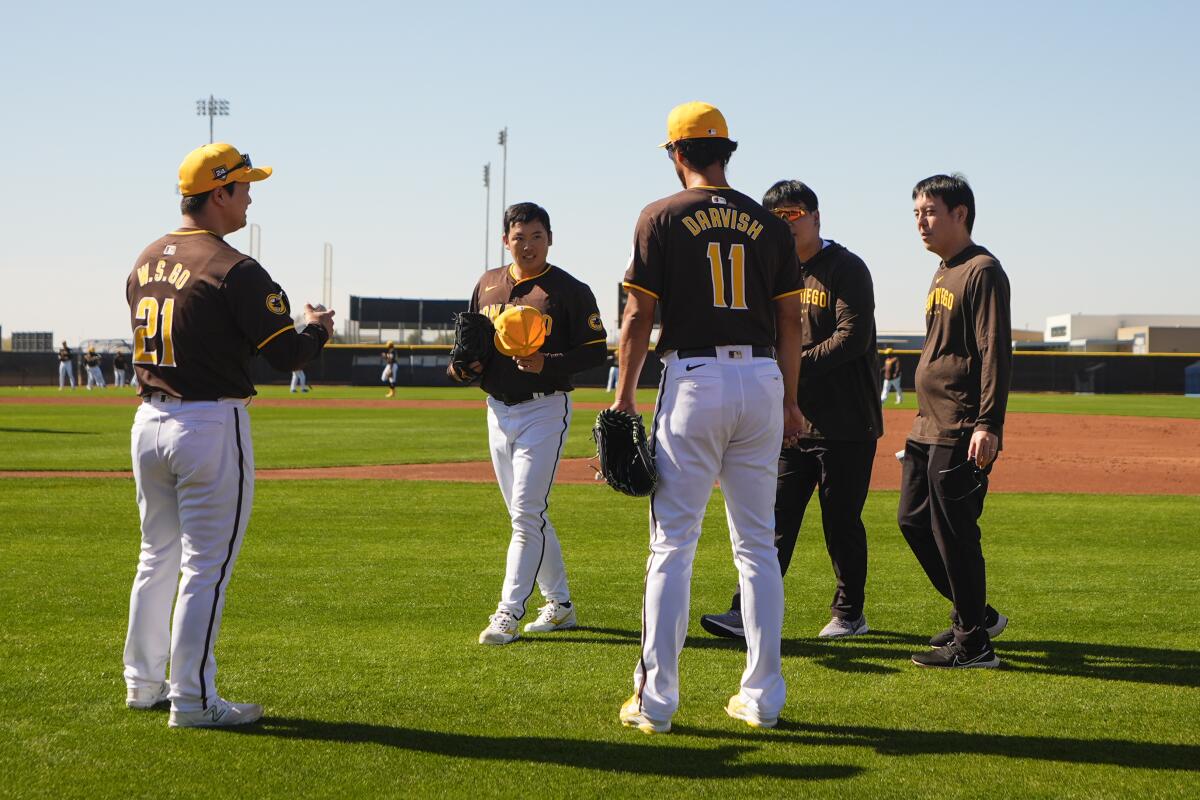[ad_1]
The day after the Dodgers deplaned at Incheon Airport, pictures of Shohei Ohtani and his wife were on the pages of every major newspaper in this country.
Not just any pages. The front pages.
On the evening news, segments on Ohtani were aired before those featuring the San Diego Padres, the Dodgers’ opening-day opponents. The Padres have a couple of Korean players in shortstop Ha-Seong Kim and right-hander Woo-Suk Go.
Ohtani is almost as popular here as he is in his home country.
“Right now,” journalist Jeeho Yoo of Yonhap News Agency said, “I think he’s the most beloved Japanese athlete in Korea.
“Ever.
“In any sport.”
For a Japanese athlete to be embraced by South Koreans to this degree is extraordinary, considering the history between their countries. Wounds remain from Japan’s brutal 35-year occupation of Korea in the early 20th century.
Such widespread admiration of a Japanese player would have been unimaginable as recently as 15 years ago, when baseball games between Japan and South Korea were as politically charged as soccer games between Argentina and England or India and Pakistan.
“Back then, with the old-school players, there was definitely tension between the two countries every time they would play each other,” Go said through an interpreter.
Yu Darvish, the Padres’ opening-day starter, played for Japan in the World Baseball Classic in 2009 and again last year. Japan played South Korea both times, but Darvish said the atmospheres were entirely dissimilar.
“There was a feeling in 2009 that South Korea was a rival, an enemy,” Darvish said in Japanese.
Japan won the first two WBCs, in 2006 and 2009, with Ichiro Suzuki as their star. Suzuki is disliked in South Korea to this day.
During a 1997 exhibition series in South Korea, Suzuki complained of the country smelling like garlic. Before the inaugural WBC, Ichiro said he wanted to teach opponents such as South Korea and Taiwan that they “couldn’t beat Japan for the next 30 years.”
South Korea defeated Japan in the first-round stage and again in the second-round group stage, after which then-Dodgers pitcher Jae Seo planted a South Korean flag on the mound in a game played at Angel Stadium.
Ichiro screamed in frustration, and later called the defeat “the most humiliating day of my baseball career.”
Japan later won the tournament.
Ohtani is considerably more respectful, which is one of the reasons he is adored here.
Asked about his popularity in South Korea this week, Ohtani replied in Japanese, “From long ago, Japan and South Korea have played games in international competitions that were extremely intense and I watched them from the time I was a child. I thought South Korea was a great team. Because of that, I’m looking forward to playing in South Korea, and I was grateful to be welcomed at the airport like that.”
Ohtani was also complimentary of South Korea and other Asian countries during the WBC last year.
Independent South Korean journalist Daniel Kim, who operates a YouTube channel with 151,000 subscribers, mentioned how Ohtani included a South Korean flag emoji in a recent caption for an Instagram post. Kim said the small gesture was appreciated, enough to where it made news.

Chan Ho Park, right, with Hyun-Jin Ryu before a game in 2014, was the first South Korean-born player in MLB.
(Jae C. Hong / Associated Press)
Chan Ho Park, a former Dodgers pitcher who was the first South Korean-born major leaguer, counts himself as one of Ohtani’s admirers. Park said South Koreans were right to view Ohtani as a role model.
“Ohtani is a perfect example,” Park said. “In the amateur leagues, they all talk about how Ohtani grew up. Obviously, working hard is the No. 1 priority, but it’s also how to behave to be the right student, the right son.”
As polite as Ohtani is, as unprecedented as his on-field performance is, why wouldn’t South Korea welcome him? The country has already welcomed plenty of other things Japanese.
Yoo mentioned that he drives a Honda and wears clothes by Uniqlo.
“There’s a good portion of the Korean population that likes Japanese culture,” Kim said. “Even when the relationship between the two nations is bad, you see Koreans traveling to Japan.”
Japan has in turn incorporated South Korean culture into its own culture.
“Like, 20 years ago, [Korean dramas], they took off in Japan first,” Kim said. “Before Japanese audiences started watching K-dramas, they were mostly a domestic thing. Somehow, they took off in Japan. K-pop took off in Japan. And then they started going all over the world.”
Baseball has also contributed to cultural exchanges.
San Francisco Giants rookie outfielder Jung Hoo Lee is the son of Jong Beom Lee, who played on South Korea’s WBC team in 2006. The younger Lee was born in Japan while his father was playing for the Chunichi Dragons in Nippon Professional Baseball.
Jung Hoo Lee’s childhood hero?
“As a kid, I loved Ichiro,” Lee said through an interpreter.
Lee shared a clubhouse in spring training this year with a Japanese player, Yoshi Tsutsugo.
“We’ve gone to dinner together and talked baseball,” Lee said.
When Go joined the Padres, he appreciated how Darvish approached him and greeted him in Korean: “Annyeonghaseyo,” or hello.

Padres relief pitcher Woo-Suk Go talks with Yuki Matsui, center, and Yu Darvish during spring training last month.
(Lindsey Wasson / Associated Press)
“We’re both from Asia,” Darvish said. “I know he has some uneasiness. At the same time, he wants to prove his strength, his personal strength, Korea’s strength. I understand that feeling.”
Go and shortstop Ha-Seong Kim now make it a point to say good morning to Darvish every day in Japanese: “Ohayo gozaimasu.”
Darvish said he purchased a translator application for his phone to communicate with his South Korean teammates.
More than anyone, Park understands the big differences that small actions like that can make. Park, who will deliver the ceremonial first pitch before the season opener on Wednesday, played with the Dodgers alongside Hideo Nomo.
Park and Nomo became lifelong friends. Nomo attended Park’s wedding. Nomo also traveled to South Korea for the opening of Park’s museum.
Park is hopeful that watching South Korean and Japanese players interact will make South Koreans and Japanese less suspicious of each other. Darvish has the same hope, saying the passing of time could heal the traumas and extinguish the prejudices of the past.
“I think it’s mostly older people who say, ‘I don’t like Korea’ or ‘I don’t like Japan,’” Darvish said.
Daniel Kim, who will be part of ESPN’s broadcast team for the Dodgers-Padres games, described the Japanese players on the Dodgers and Padres as the ultimate diplomats.
“What Shohei Ohtani and Yu Darvish have done for the last 48 hours is a lot more than what the political leaders have done on both sides in the last 10 years,” Kim said.
Darvish visited a cafe in Seoul run by a fan he befriended on Twitter.
Ohtani continued to share his fondness of South Korea, recalling a visit he made with a junior national team.
“I was still in high school at the time, so it was different than it is now,” Ohtani said. “But from that time, this was one of the countries I liked. At that point, I’d only been to Taiwan and South Korea, so in that sense, it was special. I think it’s also special that I’ve been able to come back [this week] to play baseball.”
It’s been special in other ways too — ways that extend far beyond balls and strikes and wins and losses.
[ad_2]
Source link

